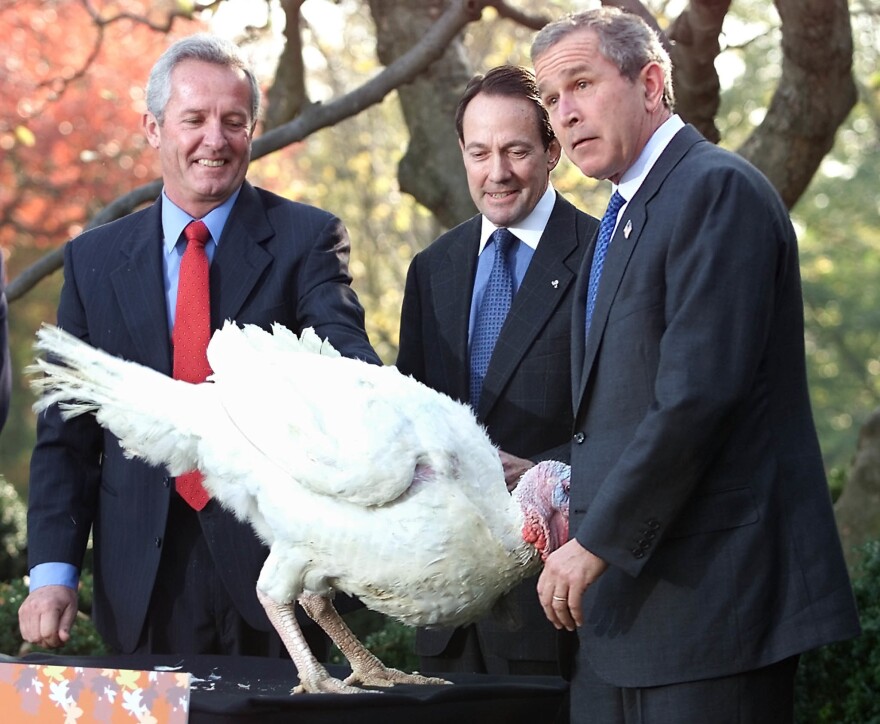President Trump has tweeted boldlyabout his power to pardon, used it once for a controversial ally, and this week he'll put his pardon pen to use for a couple of turkeys. Literally.
"President Donald J. Trump will pardon the National Thanksgiving Turkey in a ceremony in the Rose Garden," the White House confirmed in a statement.
The ceremony takes place Tuesday. It's the 70th year that the National Turkey Federation, the turkey growers' lobby, will be presenting the president with a turkey.
But the original intention wasn't to pardon turkeys; it was to do what most of the rest of us will do with them on Thanksgiving — eat them.
The ritual of presidents pardoning turkeys — rife with dad jokes — actually doesn't have that long a history.
President George H.W. Bush formalized the turkey pardon ceremony in 1989, and there were sporadic turkey pardons before that — some to distract from other controversies, like President Ronald Reagan trying to duck a question from a reporter he might have thought was a turkey — on the Iran-Contra scandal.
John F. Kennedy was the first president to pardon a Thanksgiving turkey, even though that one had a sign around its neck that read, "GOOD EATING, MR. PRESIDENT!"
"We'll just let this one grow," Kennedy said at the White House ceremony in 1963.

(A little gravy on top of your deep-cuts turkey trivia: All evidence suggests Abraham Lincoln was actually the first president to pardon a turkey, but it was a Christmas turkey that his son had taken a liking to.)
This year's turkey pardon should be interesting to watch. It's Trump's first one. It's a lighthearted event, but Trump isn't known for his public laughter. Who will he bring out with him? The first lady? His youngest son Barron? Ivanka?
There haven't been very many Trump bird sightings, but there was that cover photo shoot for Time magazine in 2015.
It didn't go so well.
Trump should beware — sometimes these turkeys can be in a fowl mood.


Other presidents have seemed to relish embarrassing their nearby children with turkey puns.
"Time flies, even if turkeys don't," President Obama said in 2015. That was met with silence, then polite laughter from his eye-rolling daughters, Sasha and Malia, as well as the audience.

Last year, Obama threatened his daughters with the promise to "do this every year from now on. ... No way I'm cutting this habit cold turkey!"
How will Trump's puns stack up? (By the way, Trump did not reverse Obama's turkey pardons and order the remaining birds executed. That was fake news.)
Also, will he get his history right? When talking turkey, other presidents have erred.
"President Truman was the first president to pardon a turkey," Bill Clinton claimed at a pardoning ceremony in 1997.
But the Truman Presidential Library said in a statementthat there's no evidence of that. In fact, the library said, "Truman sometimes indicated to reporters that the turkeys he received were destined for the family dinner table."
The president probably won't bring up the dark side of turkey pardoning. The birds are bred to be eaten, and because of their size, most don't live very long after their pardoning.
Because of that, animal-rights activists think this tradition should be canceled. In their view, you could say, it's ... for the birds.
Although instead of simply going to a farm to live out their — limited — days, the turkeys are now sent to Virginia Tech's Department of Animal and Poultry Sciences. Yes, that's a thing.
Of course, the other solution is to revert to the original purpose of the ceremony.
Buon appetito!
Domenico Montanaro is the lead political editor for NPR, an amateur presidential turkey pardon historian and proud Thanksgiving cook.
To brine or not to brine... Happy Thanksgiving!
Copyright 2023 NPR. To see more, visit https://www.npr.org.



